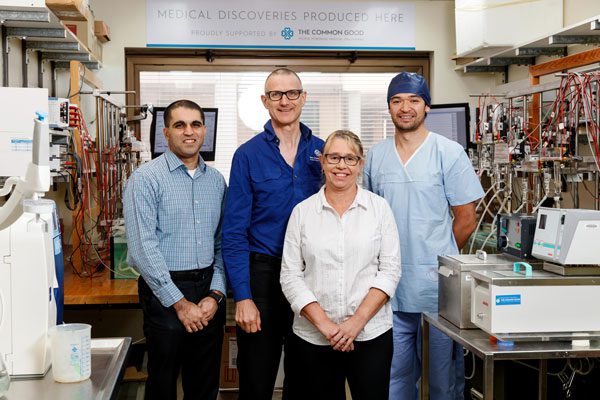
Members of the research group (l to r): Assoc Prof Haris Haqqani, Prof Peter Molenaar, Elizabeth Cheesman and Dr Alex Dashwood
Research study may find new therapies for heart failure sufferers
A research group at The Prince Charles Hospital (TPCH) is investigating the cause of abnormal heart rhythms in people with advanced heart failure, to help identify potential new therapies.
The study, being undertaken by TPCH cardiologists and researchers from The University of Queensland and Queensland University of Technology under the supervision of Prof Peter Molenaar, uses tissue from explanted hearts of patients with advanced heart failure undergoing transplantation.
Cardiac researcher, Dr Alex Dashwood said that in patients with heart failure, sudden cardiac death from arrhythmias or abnormal heart rhythms is a feared complication.
“Unfortunately, we don’t truly understand the complex cellular and molecular processes involved in generating arrhythmias,” Dr Dashwood said.
Despite the development of disease modifying medications, around 50 percent of patients with heart failure die within five years of diagnosis. Ventricular arrhythmias have been documented in up to 85 percent of patients with heart failure and up to 30-50 percent of heart failure patients will die of sudden cardiac death.
“In the simplest terms the heart is a pump. Patients with heart failure have a failing pump; it does not pump enough blood and oxygen to the organs required for normal metabolic activity,” Dr Dashwood said.
“Because the heart can’t pump properly, the body counteracts this with other pathways which in the long term worsen heart failure; one of which is sympathetic activation. We also know that in conditions of poor perfusion, aerobic respiration is impaired and there is oxidative stress.
“Our team is studying how the conditions of chronic sympathetic activation and oxidative stress may play a role in generating arrhythmias.
“In our study, we will recreate these conditions on heart tissue to determine if there is an effect on the heart’s contractile function and arrhythmia generation. We then study molecular channels involved in controlling the beating heart and determine how they have been modified.
“If we have evidence these conditions have a role in creating bad heart beats, we can then test these conditions in the presence of various medications that are known to block these conditions or even reverse them.
“If these medications are effective in preventing these conditions, this has the potential to create new treatment options for patients with advanced heart failure.”
The study is being supported by The Common Good, an initiative of The Prince Charles Hospital Foundation. Acknowledgement goes to the support of the surgeons and the patients who kindly donate their explanted hearts to research.
Research group members are Prof Peter Molenaar, Assoc Prof Haris Haqqani, Dr Yee Weng Wong, Dr Alex Dashwood, Elizabeth Cheesman, Andrew Battle and Melanie Spratt.
